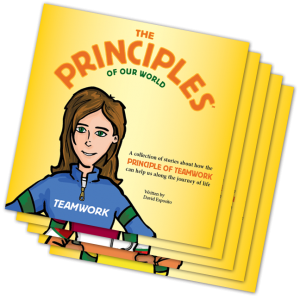Our world has no shortage of issues that seem to create massive polarization between people. Whether it is a political, social, economic, or family issue, we see a growing trend to move quickly to “our corner” of the ring. As we continue on our journey to build and strengthen our character, it is an important time to reinforce how listening to one another is the first step towards empathy and empathy is at the heart of building constructive dialogue, improving relationships, and comforting the hurting.
There are plenty of “experts” who would described the importance of listening to others as a key ingredient to understand another person and through understanding, we can begin to build better relationships. In addition, I am sure we have all experienced the occasional “aha” moments when we finally shut-up enough to listen and gained some real insight into understanding another person and why they have a certain point of view or why they took a certain action.
At several major academic centers there has been some exciting new research that demonstrates the power of our brains to relate to one another when we truly listen. Researchers have gone beyond traditional techniques of simply mapping activity in particular regions of the brain. This new research uses complex mathematical analyses to map patterns of activity in the brain, but not in isolation. The research has added the dimension of measuring the relationship between the pattern in one person’s brain and the pattern in another’s.
Researchers are recording the brain activity of one person’s brain while they told a story and another person’s brain who was listening. The two brain patterns consistently show a remarkable degree of correlation. The storyteller literally has gotten in to the listener’s brain and altered it not only on the logic-reasoning parts of the brain, but most importantly, on the emotional part of the brain. By focusing on listening, the listener has been able to match the brain of the storyteller. The listener felt the emotions of the storyteller.
This new research demonstrates over and over that when you listen to and understand another person, you experience the exact same brain pattern as that person. It is as if you have experienced their experience. The researchers demonstrated that our brains know little difference between our own experience and one we shared by listening to another. Our brains are impacted the same way. Listening to another person can provide real insight into another person’s journey and help us understand.
This recent round of groundbreaking research is a strong reminder that our personal effort to focus on listening is an important choice that we can make to have a positive impact on relationships. Here are just a few thoughts to reinforce the importance of listening:
(1) Listening is the most simple and powerful way to demonstrate to someone that they matter. Our decision to listen meets a very important psychological need of all of us – to know we matter. Listening does not take a Ph.D. in psychology, an extremely high IQ, or some position in the corner office. All it takes is a simple decision to be silent and give someone our attention.
(2) As life today grows more intense and complex, before we instinctively move to “our side” with “our brilliant opinion,” we should first choose to listen. As the research showed, when we listen, we actually feel the experience of the other person. This is a relevant and practical choice for our home, our workplace, and our community at large. As with many things, the greatest and most challenging area is listening to those that are closest to us. We mistakenly think we know them well enough or we have allowed the obstacles of anger, frustration, and apathy to prevent us from listening to the other side of the story…and there is always another side to the story.
(3) For most people, it is our painful experiences that have taught us the most and form the basis for many of the choices we make. However, we typically keep hidden those painful experiences from others. Being a good listener can help build a trusting, non-judgmental, and shame-free atmosphere which can eventually open a door to the sharing of those painful experiences to assist in a greater understanding of one another. Understanding is the foundation for health in relationships.
Listening, with the intent to understand, is a well-documented approach to improve relationships. As we make a decision to listen, we will build and strengthen our character and Character Creates Opportunity® to build healthy and meaningful relationships.


 This reason goes beyond marriages. Incompatibility is at the root of parent-child conflict, in-law struggles, and the “exiled” cousin or uncle who disappears from the family radar screen. Quite often, the genesis of our struggles in families is the devaluing or resentment of our differences instead of embracing and treasuring our differences to build something bigger and better than ourselves. We would not tolerate a point of view in the workplace that says “we don’t like people to be different.” However, in our homes, we are so quick and willing to enable differences to divide and break-up our family without first putting forth the effort to better understand those differences and hopefully, try and appreciate those differences to keep the family circle intact.
This reason goes beyond marriages. Incompatibility is at the root of parent-child conflict, in-law struggles, and the “exiled” cousin or uncle who disappears from the family radar screen. Quite often, the genesis of our struggles in families is the devaluing or resentment of our differences instead of embracing and treasuring our differences to build something bigger and better than ourselves. We would not tolerate a point of view in the workplace that says “we don’t like people to be different.” However, in our homes, we are so quick and willing to enable differences to divide and break-up our family without first putting forth the effort to better understand those differences and hopefully, try and appreciate those differences to keep the family circle intact. Children’s Books Reinforce the Importance of Principle-based Decision Making
Children’s Books Reinforce the Importance of Principle-based Decision Making In the complexity of life, we rarely have all the necessary information, the facts are not always gathered, and quite often there is not a clear cut answer. Regardless, the situation still demands a decision and an action. If the decision is pretty straight-forward, then we better get in the habit of making them quickly and spending our effort in adding value in more complex areas otherwise we risk being replaced by a computer with an algorithm in work or becoming irrelevant in the home.
In the complexity of life, we rarely have all the necessary information, the facts are not always gathered, and quite often there is not a clear cut answer. Regardless, the situation still demands a decision and an action. If the decision is pretty straight-forward, then we better get in the habit of making them quickly and spending our effort in adding value in more complex areas otherwise we risk being replaced by a computer with an algorithm in work or becoming irrelevant in the home.